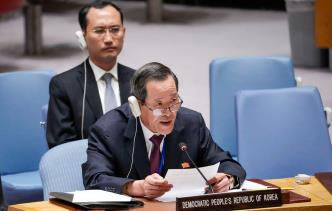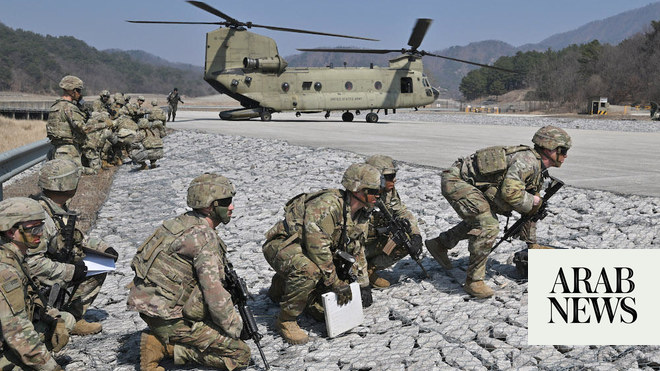
The fast-moving events regarding North Korea are part of a wider attempt at President Donald Trump’s zig-zag diplomacy over one of the world’s most sensitive security issues. Trump canceled the Singapore summit with Kim Jong Un on the same day that North Korea claimed to have destroyed its nuclear testing facility.
Pyongyang’s demolition of the Punggye-ri nuclear test site, where it tested six nuclear warheads, is part of the process. Three tunnels were destroyed and Pyongyang invited journalists from China, Russia, the US, South Korea and Britain to witness the site’s dismantling. The complete closure of the area surrounding the nuclear test ground will come after the successive removal of all observation facilities, research institutes and structures of guard units, and withdrawal of staff.
But the destruction of the test site alone does not necessarily signify any change in nuclear ambitions or capability. Based on details available so far on the dismantling of Punggye-ri, North Korea’s moves do not appear to have irreversibly put the site out of commission. This type of demolition does not go far enough, with no known international experts able to inspect and verify.
Trump’s letter to Kim, saying that their planned meeting in Singapore on June 12 will not happen, is a counterpunch to Pyongyang. In the letter sent by the White House, Trump said that, although he was very much looking forward to being in Singapore with Kim, it was “inappropriate” to have the meeting at this time, “based on the tremendous anger and open hostility” displayed in North Korea’s statements regarding US Vice President Mike Pence. Earlier, North Korea’s Vice Minister for Foreign Affairs Choe Son Hui labeled remarks by Pence as “unbridled and impudent,” and “ignorant and stupid.”
More important are the comments made by National Security Adviser John Bolton, who raised the “Libya model” as a potential pathway for North Korea if Pyongyang does not follow the negotiated timeline. Bolton’s comments struck North Korea as particularly nasty given how Muammar Qaddafi met his fate.
The White House has still opened the possibility of meeting another time as part of the negotiation process. The letter states: “Therefore, please let this letter serve to represent that the Singapore summit, for the good of both parties, but to the detriment of the world, will not take place,” with Trump adding that he still looks very much forward to meeting Kim “some day.”
Trump’s letter to Kim, saying that their planned meeting in Singapore on June 12 will not happen, is a counterpunch to Pyongyang.
Dr. Theodore Karasik
In this round, the Trump administration managed to free three Americans — Kim Dong Chul, Tony Kim and Kim Hak Song — who were being held in North Korean prisons. In this case, Trump publicly thanked Kim and called him “nice” for releasing the three prior to their now-canceled summit. However, the US had actually made the release of the three a condition for the summit. It would have been unthinkable for the US president to sit down and talk with Kim without the return of the three Americans. One had been sentenced to 10 years’ hard labor and all three were charged with “hostile acts,” spying or other crimes without any semblance of due process and were denied regular visits by the US protecting power, Sweden, and direct contact with their families. It is quite possible that North Korea may now return to using prisoners as hostages.
In Northeast Asia, there is dismay at Trump’s decision. South Korea’s presidential Blue House seemed blindsided by the cancelation of the summit. “We are attempting to make sense of what, precisely, President Trump means,” it said in a clear signal of the personal nature of the bilateral negotiations between Washington and Pyongyang.
Expectations were overblown for the North Korea summit and there are legitimate reasons to question whether Kim is serious about giving up his nuclear weapons. With Trump’s letter, the crisis on the Korean Peninsula returned. The planned summit was an opportunity to test Kim’s intentions, but the rhetoric in Trump’s letter and the comparison of nuclear weapons sizes harms the chances of future talks and returns the agenda to the tit-for-tat escalations seen last year.
This outcome will likely force North Korea to accelerate work on its nuclear and missile programs, strain America’s ties with South Korea, reduce international pressure on Beijing to rein in Pyongyang, and undermine future attempts at nuclear diplomacy. Trump is threatening again the use of military action if North Korea tries to provoke the US. Trump’s “fire and fury” is back for act two.
• Dr. Theodore Karasik is a senior adviser to Gulf State Analytics in Washington, D.C. He is a former RAND Corporation Senior Political Scientist who lived in the UAE for 10 years, focusing on security issues.
Twitter: @tkarasik












